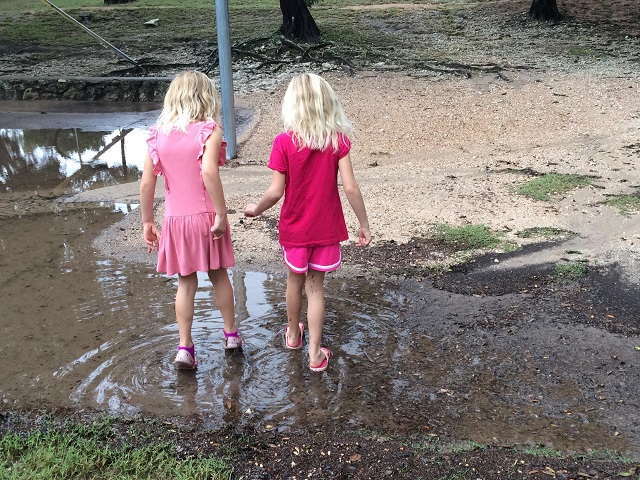Last night, one of my five-year-old daughters (I have twins) asked me to rub her back.
But instead of “rub” she said “ruv”—that’s how she’s always pronounced it. I’ve never corrected her, as I didn’t want to cramp her style, and I knew what she meant.
I know what her sister means when she complains, “It’s stuffy!” Her clothes are too tight or too scratchy.
My girls don’t read yet, so we play fast and loose with words.
Both my girls started kindergarten this year—real school. Their journey as readers also begins this year. All those nights I lay in bed reading to them—pouring words and visions into their heads—leads to this one big step. I watched my older son go through this a few years ago, so I know it’s an amazing metamorphosis.
They’ll learn that “e” makes the previous vowel “say its name.”
They’ll stop saying, “I builded it” and instead say, “I built it.”
They’ll see how crazy their native tongue can be, when they grasp the difference between “their,” “they’re” and “there.”
One day they’ll read Frog and Toad back to me. Eventually they’ll get lost in the worlds of Little House on the Prairie and Harry Potter. They find kinship with Judy Blume and Jane Austen. Along the way they’ll join the authors-and-readers connection that stretches back centuries.
Once they can read on their own, I’ll relax about “schooling,” because no matter where they are, they’ll be able to learn on their own. And I know being good readers will open their imaginations and lead to a whole host of health benefits.
So why am I worried?
Because I can’t help but wonder—will my girls lose something when they learn to read?
My daughters will move from their preliterate imaginations into a more orderly way of thinking. As readers, they’ll begin to understand narrative structure, cause and effect, facts and figures. The world will take on a more logical form when they can arrange sound and symbol into patterns of 26 marks along a notebook line.
But what gets pushed out in the process? Once they’ve been taught to think in a standard way, will their ability to see the world with their own new eyes disappear?
If my girls are reading by the end of this school year, will they still make up words that don’t exist in the dictionary? Will they continue to bend language to their will? Will my most sensitive daughter still say things like, “The bone in my pinky finger feels soft”?
When they were babies, I would catch my daughters watching my lips move as I talked to them. In turn, I studied them. If they had no words, what magnet did their thoughts gather around?
Did they see the world differently when they began to speak words?
Will that vision change once again when they learn to read?
This reading transition sends me into thought spirals—maybe the step feels momentous, because kids mature so much in kindergarten anyway. The baby fat leaves their cheeks and “milk” teeth are replaced by adult chompers. Social skills tune up, and tantrums fade away.
Maybe this worry has nothing to do with reading itself.
When I drill down into my fear, I see it’s really about me not being ready for my girls to move away from me yet—as my nine-year-old son already has. Parenting my son now is more about driving to activities and less about holding hands—more about bringing him his book at night and less about snuggling in together to read it aloud.
I know change is good—and inevitable—and I’m ready for my daughters to stop shouting, “Goldfish!” when it’s someone else’s turn to pick a card in Go Fish.
But I’ll always miss—and cherish—“ruv-ing” their backs.
.
Relephant:
Top 10 Illustrated Kids’ Books Not to Be Missed.
The Importance of Multicultural Literature for Children: 9 Book Recommendations.
.
Author: Virginia Woodruff
Apprentice Editor: Brook Bentley/Editor: Yoli Ramazzina
Photo: Author’s own.











Read 0 comments and reply